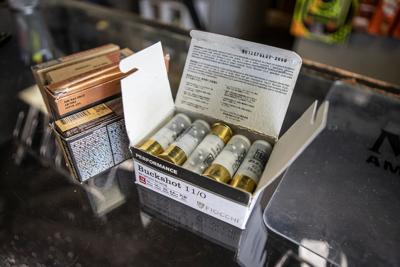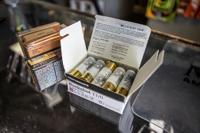
Box of ammo on display at a gun shop in Fresno County on July 12, 2022. Photo by Larry Valenzuela, (CalMatters/CatchLight Local)
The 9th U.S. Circuit Court of Appeals struck down California’s first-in-the-nation law requiring background checks for ammunition purchases, another blow to the state’s gun control framework that has been pared down, case by case, since the U.S. Supreme Court dramatically expanded gun rights in a monumental 2022 decision.
The California law that forced ammunition purchasers to pass a background check was passed by voters in 2016. Gov. Gavin Newsom, at the time the state’s lieutenant governor, championed the initiative and was its primary advocate.
In 2018, before the law went into effect, a group of gun rights advocates and ammunition vendors sued to block the law.
They were successful – in 2020, a federal district court judge handed down an injunction against the background checks of ammunition purchasers. But at the time, the 9th Circuit paused that order and allowed the law to take effect.
Two years later, the U.S. Supreme Court ruled in New York State Rifle & Pistol Association, Inc. v. Bruen that a New York concealed-carry law unfairly constrained people’s right to carry a gun, and California’s gun control regime was thrown into chaos.
The 9th Circuit then sent the case on background checks for ammunition purchases back down to the federal district court. That court again ruled against the background checks.
Today’s ruling helped clarify what a post-Bruen future could look like.
“Given the fees and delays associated with California’s ammunition background check regime, and the wide range of transactions to which it applies, we conclude that, in all applications, the regime meaningfully constrains California residents’ right to keep and bear arms,” Justice Sandra Segal Ikuta wrote in the 2-1 majority opinion.
Newsom in a written statement criticized the decision. “Strong gun laws save lives – and today’s decision is a slap in the face to the progress California has made in recent years to keep its communities safer from gun violence. Californians voted to require background checks on ammunition and their voices should matter,” he said.
The law required face-to-face transactions from a licensed dealer. That effectively banned internet sales of ammunition, and any ammunition purchased out of state required that it be delivered from that state to a licensed dealer in California
Purchasers would swipe a government ID and their information would be run through four databases, which searched for their criminal histories, any firearm prohibitions for mental health, restraining orders and whether they were on a wanted persons list. They would also have to pay a fee to have their information run through the state Justice Department’s firearms data repository.
The question posed by the Supreme Court in the Bruen decision is whether a law “meaningfully constrains the right to keep and bear arms,” as specified in the Second Amendment, and whether it is consistent with the country’s “historical tradition of firearm regulation.”
Using that test, the 9th Circuit previously agreed with California that an Alameda County zoning law prohibiting gun stores within 500 feet of a residential area, or a law that bans firearm sales on state property, are both constitutional. The reasoning behind those decisions was that people could still buy guns in Alameda County, or somewhere besides state property.
The Rhodes case is different, the appellate court ruled, because it meaningfully constrains people’s ability to purchase ammunition, which previous 9th Circuit decisions have found is foundational to a person’s ability to own guns.
In court, the state’s attorneys also proposed that California’s ammunition sales law conformed to the United States’ historical tradition of regulating guns, citing colonial-era laws or laws written after the Civil War.
The court dismissed those arguments.
“Because none of the historical analogues proffered by California is within the relevant time frame, or is relevantly similar to California’s ammunition background check regime, California’s ammunition background check regime does not survive scrutiny under the two-step Bruen analysis,” Ikuta wrote.
In a fiery dissent, Judge Jay Bybee said the decision failed to correctly apply the Bruen test, and that using the logic of the decision, any firearms regulation could be interpreted as a violation of the Second Amendment.
“It is difficult to imagine a regulation on the acquisition of ammunition or firearms that would not ‘meaningfully constrain’ the right to keep and bear arms under the majority’s new general applicability standard,” Bybee wrote in the dissent.










(0) comments
Welcome to the discussion.
Log In
Keep it Clean. Please avoid obscene, vulgar, lewd, racist or sexually-oriented language.
PLEASE TURN OFF YOUR CAPS LOCK.
Don't Threaten. Threats of harming another person will not be tolerated.
Be Truthful. Don't knowingly lie about anyone or anything.
Be Nice. No racism, sexism or any sort of -ism that is degrading to another person.
Be Proactive. Use the 'Report' link on each comment to let us know of abusive posts.
Share with Us. We'd love to hear eyewitness accounts, the history behind an article.